2006年日语四级考试试题及答案
(完整word版)06年专四真题及答案,推荐文档
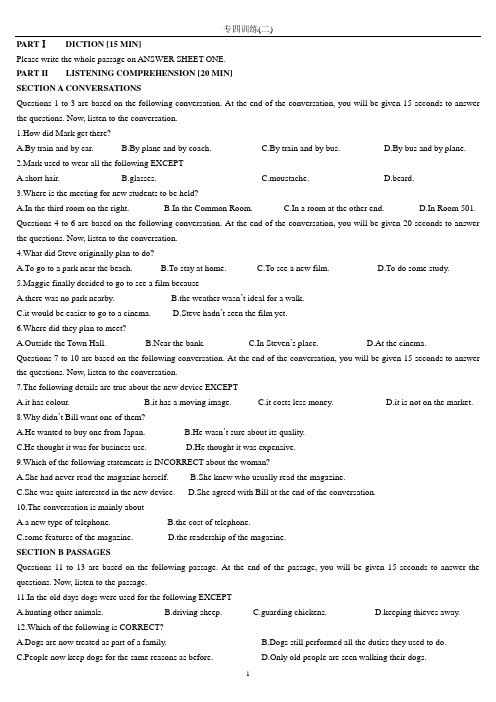
PARTⅠDICTION [15 MIN]Please write the whole passage on ANSWER SHEET ONE.PART II LISTENING COMPREHENSION [20 MIN]SECTION A CONVERSATIONSQuestions 1 to 3 are based on the following conversation. At the end of the conversation, you will be given 15 seconds to answer the questions. Now, listen to the conversation.1.How did Mark get there?A.By train and by car.B.By plane and by coach.C.By train and by bus.D.By bus and by plane.2.Mark used to wear all the following EXCEPTA.short hair.B.glasses.C.moustache.D.beard.3.Where is the meeting for new students to be held?A.In the third room on the right.B.In the Common Room.C.In a room at the other end.D.In Room 501. Questions 4 to 6 are based on the following conversation. At the end of the conversation, you will be given 20 seconds to answer the questions. Now, listen to the conversation.4.What did Steve originally plan to do?A.To go to a park near the beach.B.To stay at home.C.To see a new film.D.To do some study.5.Maggie finally decided to go to see a film becauseA.there was no park nearby.B.the weather wasn’t ideal for a walk.C.it would be easier to go to a cinema.D.Steve hadn’t seen the film yet.6.Where did they plan to meet?A.Outside the Town Hall.B.Near the bank.C.In Steven’s place.D.At the cinema.Questions 7 to 10 are based on the following conversation. At the end of the conversation, you will be given 15 seconds to answer the questions. Now, listen to the conversation.7.The following details are true about the new device EXCEPTA.it has colour.B.it has a moving image.C.it costs less money.D.it is not on the market.8.Why didn’t Bill want one of them?A.He wanted to buy one from Japan.B.He wasn’t sure about its quality.C.He thought it was for business use.D.He thought it was expensive.9.Which of the following statements is INCORRECT about the woman?A.She had never read the magazine herself.B.She knew who usually read the magazine.C.She was quite interested in the new device.D.She agreed with Bill at the end of the conversation.10.The conversation is mainly aboutA.a new type of telephone.B.the cost of telephone.C.some features of the magazine.D.the readership of the magazine.SECTION B PASSAGESQuestions 11 to 13 are based on the following passage. At the end of the passage, you will be given 15 seconds to answer the questions. Now, listen to the passage.11.In the old days dogs were used for the following EXCEPTA.hunting other animals.B.driving sheep.C.guarding chickens.D.keeping thieves away.12.Which of the following is CORRECT?A.Dogs are now treated as part of a family.B.Dogs still performed all the duties they used to do.C.People now keep dogs for the same reasons as before.D.Only old people are seen walking their dogs.13.The passage is mainly aboutA.what dogs can do.B.how to keep dogs.C.dogs and their masters.D.reasons for keeping dogs. Questions 14 to 17 are based on the following passage. At the end of the passage, you will be given 20 seconds to answer the questions. Now, listen to the passage.14.According to the passage, the working conditions in the new placeA.are the same as the speaker is used to.B.are expected to be rather poor.C.are just as adequate.D.are not yet clear.15.What is the speaker going to do in the new place?A.Travelling.B.Studying.C.Settling down.D.Teaching.16.The speaker expectsA.fewer choices of food.B.many ways to do washing.C.modern lighting facilities.D.new types of drinking water.17.From the passage we learn that the speakerA.is unprepared for the new post.B.is unclear about the conditions there.C.is ready for all the difficulties there.D.is eager to know more about the post.Questions 18 to 20 are based on the following passage. At the end of the passage, you will be given 15 seconds to answer the questions. Now, listen to the passage.18.According to the passage, when are children first expected to study hard?A.Before 6 years of age.B.Between 6 and 10.C.After 10 years of age.D.After 12 years of age.19. Parents who abuse their children tend to have the following problems EXCEPTA.religious problems.B.emotional problems.C.financial problems.D.marriage problems.20.Which of the following statements is CORRECT?A.Boys and girls are equally energetic.B.Parents have higher expectations for boys.C.Some parents lack skills to deal with their kids.D.Some parents are ill-educated and ill-tempered. SECTION C NEWS BROADCASTQuestions 21 to 23 are based on the following news. At the end of the news item, you will be given 15 seconds to answer the questions. Now, listen to the news.21.What has happened to the Cubans?A.They set foot in Floria.B.They were drowned.C.They were flown to the U.S.D.They were sent back to Cuba.22.How did the Cubans try to enter the U.S.?A.In a small boat.B.In an old truck.C.By swimming.D.By driving.Questions 23 are based on the following news. At the end of the news item, you will be given 10 seconds to answer the questions. Now, listen to the news.23.How many cities will have air quality monitoring systems installed by the end of this year?A.42 cities.B.220 cities.C. 150 cities.D. 262 cities.Questions 24 and25 are based on the following news. At the end of the news item, you will be given 10 seconds to answer the questions. Now, listen to the news.24. Altogether how many people were reported missing?A. 68.B.90.C. 150.D. 40.25.Which of the following details is INCORRECT?A.The two ferries sank on different days.B.The accidents were caused by storms.C.The two ferries sank on the same river.D.More people were rescued from the first ferry.Questions 26 are based on the following news. At the end of the news item, you will be given 10 seconds to answer the questions.Now, listen to the news.26.What is the news item mainly about?A.Indonesian government policies.B.Australia’s support to the UN assistance mission.C.Opening of an Australian consulate in East Timor.D.Talks between Australia and Indonesia.Questions 27 to 28 are based on the following news. At the end of the news item, you will be given 15 seconds to answer the questions. Now, listen to the news.27. The news item is mainly about a joint venture betweenA.a US company and a UK company.B.a Swiss company and a UK company.C.two Taiwanese companies.D.a mainland company and a US company.28.Who will provide the distribution networks in the joint venture?A.Unilever.B.Nestle.C.PepsiCo.D.Coca Cola.Questions 29 to 30 are based on the following news. At the end of the news item, you will be given 15 seconds to answer the questions. Now, listen to the news.29.Who staged the protect on Saturday?A.The soldiers.B.The peace camp.C.The militants.D. The hardliners.30. Which of the following details about the news is INCOPPECT?A.13 soilders were killed last week.B.100,000 people participated in the protest.C. The protesters demanded a pullout from Gaza.D.The Prime Minister rejected the pullout plan.PART ⅢCLOZE [15 MIN]There are many superstitions in Britain, but one of the most ( 31 )_held is that it is unlucky to walk under a ladder--- even if it means (32)_the pavement into a busy street! (33)_you must pass under a ladder you can (34)_bad luck by crossing your fingers and (35)_them crossed until you have seen a dog. (36)_, you may lick your finger and (37)_a cross on the toe of your shoe, and not look again at the shoe until the (38)_has dried.Another common (39)_is that it is unlucky to open an umbrella in the house---it will either bring (40)_to the person who opened it or to the whole (41)_. Anyone opening an umbrella in fine weather is (42)_, as it inevitably brings rain! The number 13 is said to be unlucky for some, and when the 13th day of the month (43)_on a Friday, anyone wishing to avoid a bad event had better stay (44)_.The worst misfortune that can happen to a person is caused by breaking a mirror, (45)_it brings seven years of bad luck! The superstition is supposed to (46)_in ancient times, when mirrors were considered to be tools of the gods.Black cats are generally considered lucky in Britain, even though they are (47)_witchcraft. It is (48)_lucky if a black cat crosses your path-although in America the exact opposite belief prevails. Finally, a commonly held superstition is that of touching wood (49)_luck. This measure is most often taken if you think you have said something that is tempting fate, such as “my car has never (50)_, touch wood?”31. A broadly B widely C quickly D speedily32. A running from B jumping off C stepping off D keeping from33. A If B As C Though D Unless34. A erase B remove C avoid D ease35. A keep B keeping C kept D to keep36. A Consequently B However C Comparatively D Alternatively37. A make B print C perform D produce38. A label B symbol C mark D cut39. A argument B superstition C opinion D idea40. A loss B difficulty C tragedy D misfortune41. A house B household C home D circle42. A unwise B unintelligent C unpopular D unfortunate43. A falls B arrives C drops D happens44. A away B outdoors C indoors D far45. A when B as C if D though46. A have originated B be originating C be originated D originate47. A concerned about B related with C associated with D connected in48. A especially B specially C frequently D rarely49. A as B for C in D of50. A broken up B broken off C broken away D broken downPART IV GRAMMAR&VOCABULARY [15MIN]51. __ dull he may be, he is certainly a very successful top executive.A AlthoughB whateverC AsD However52. If only I __ play the guitar as well as you!A wouldB couldC shouldD might53. The party, __ I was the guest of honour, was extremely enjoyable.A by whichB for whichC to whichD at which54. It’s high time we __ cutting down the rainforests.A stoppedB had to stopC shall stopD stop55. The student said there were a few points in the essay he __ impossible to comprehend.A has foundB was findingC had foundD would find56. Loudspeakers were fixed in the hall so that everyone __ an opportunity to hear the speech.A ought to haveB must haveC may haveD should have57. I am surprised __ this city is a dull place to live in.A that you should thinkB by what you are thinkingC that you would thinkD with what you were thinking58. Susan is very hardworking, but her pay is not __ for her work.A enough goodB good enoughC as good enoughD good as enough59. It is imperative that the government __ more investment into the shipbuilding industry.A attractsB shall attractC attractD has to attract60. Land belongs to the city; there is __ thing as private ownership of land.A no such aB not suchC not such aD no such61. My daughter has walked eight miles today. We never guessed that she could walk __ far.A /B suchC thatD as62. The statistics __ that living standards in the area have improved drastically in recent times.A provesB is provingC are provingD prove63. There are only ten apples left in the baskets, __ the spoilt ones.A not countingB not to countC don’t countD having not counted64. It was __ we had hopedA more a success thanB a success more thanC as much of a success asD a success as much as65. There used to be a petrol station near the park, __?A didn’t itB doesn’t thereC usedn’t it?D didn’t there66. It is an offence to show __ against people of different races.A distinctionB differenceC separationD discrimination67. A great amount of work has gone into __ the Cathedral to its previous splendour.A refreshingB restoringC renovatingD renewing68. The thieves fled with the local police close on their __.A backsB necksC toesD heels69. The economic recession has meant that job __ is a rare thing.A securityB safetyC protectionD secureness70. Many people nowadays save money to __ for their old age.A caterB supplyC provideD equip71. The tone of the article __ the writer’s mood at the time.A reproducedB reflectedC imaginedD imitated72. This is not the right __ to ask for my help; I am far too busy even to listen!A momentB situationC opportunityD circumstance73. The job of a student accommodation officer __ a great many visits to landladies.A concernsB offersC asksD involves74. Our family doctor’s clinic __ at the junction of two busy roads.A restsB standsC staysD seats75. She was so fat that she could only just __ through the door.A assembleB appearC squeezeD gather76. After the heavy rain, a builder was called to repair the roof, which was __.A leakingB tricklingC drippingD floating77. The reception was attended by __ members of the local community.A excellentB conspicuousC prominentD noticeable78. Share prices on the Stock Exchange plunged sharply in the morning but __ slightly in the afternoon.A regainedB recoveredC restoredD revived79. His __ brain has worked away on the idea of a universal cure.A richB quickC productiveD fertile80. The couple has donated a not __ amount of money to the foundation.A inconsiderableB inconsiderateC inaccurateD incomparablePART ⅤREADING COMPREHENSION [25MIN]TEXT AIn the case of mobile phones, change is everything. Recent research indicates that the mobile phone is changing not only our culture, but our very bodies as well.First, let’s talk about culture. The difference between the mobile phone and its parent, the fixed-line phone, is that a mobile number corresponds to a person, while a landline goes to a place. If you call my mobile, you get me. If you call my fixed-line phone, you get whoever answers it.This has several implications. The most common one, however, and perhaps the thing that has changed our culture forever, is the “meeting” influence. People no longer need to make firm plans about when and where to meet. Twenty years ago, a Friday night would need to be arranged in advance. You needed enough time to allow everyone to get from their place of work to the first meeting place. Now, however, a night out can be arranged on the run. It is no longer “see you there at 8”, but “text me aroun d 8 and we’ll see where we all are”.Texting changes people as well. In their paper, “insights into the Social and Psychological Effects of SMS Text Messaging”,two British researchers distinguished between two types of mobile phone users: the “talkers” and the “texters”-those who prefer voice to text message and those who prefer text to voice.They found that the mobile phone’s individuality and privacy gave texters the ability to express a whole new outer personality. Texters were likely to report that their family would be surprised if they were to read their texts. This suggests that texting allowed texters to present a self-image that differed from the one familiar to those who knew them well.Another scientist wrote of the changes that mobiles have brought to body language. There are two kinds that people use while speaking on the phone. There is the “speakeasy”: the head is held high, in a self-confident way, chatting away. And there is the “spacemaker”: these people focus on themselves and keep out ot her people.Who can blame them? Phone meetings get cancelled or reformed and camera-phones intrude on people’s privacy. So, it is understandable if your mobile makes you nervous. But perhaps you needn’t worry so much. After all, it is good to talk.81 when people plan to meet nowadays, theyA arrange the meeting place beforehandB postpone fixing the place till last minuteC seldom care about when and where to meetD still love to work out detailed meeting plans.82 According to the two British researchers, the social and psychological effect are mostly likely to be seen onA TALKERSB the "speakeasy"C the “spacemaker”D texters83 We can infer from the passage that the texts sent by texters areA quite revealingB well writtenC unacceptable by othersD shocking to others84 according to the passage, who is afraid of being heard while talking on the mobile?A TalkersB T he “speakeasy”C T he “spacemaker”D Texters85 an appropriate title for the passage might beA The SMS effectB Cultural implication of mobile useC Change in the use of the mobileD Body language and the mobile phone!TEXT BOver the last 25 years, British society has changed a great deal-or at least many parts of it have. In some ways, however, very little has changed, particularly where attitudes are concerned. Ideas about social class-whether a person is “working-class” or “middle-class”--are one area in which changes have been extremely slow.In the past, the working-class tended to be paid less than middle-class people, such as teachers and doctors. As a result of this and also of the fact that workers’ jobs were generally much less secure, distinct differences in life-styles and attitudes came into existence. The typical working man would collect his wages on Friday evening and then, it was widely believed, having given his wife her “housekeeping”, would go out and squander the rest on beer and betting.The stereotype of what a middle-class man did with his money was perhaps nearer the truth. He was-and still is – inclined to take a longer-term view. Not only did he regard buying a house as a top priority, but he also considered the education of his children as extremely important. Both of these provided him and his family with security. Only in very few cases did workers have the opportunity (or the education and training) to make such long-term plans.Nowadays, a great deal has changed. In a large number of cases factory workers earn as much, if not more, than their middle-class supervisors. Social security and laws to improve job-security, combined with a general rise in the standard of living since the mid-fifties of the 20th century, have made it less necessary than before to worry about “tomorrow”. Working-class people seem slowly to be losing the feeling of inferiority they had in the past. In fact there has been a growing tendency in the past few years for the middle-classes to feel slightly ashamed of their position.The changes in both life-styles and attitudes are probably most easily seen amongst younger people. They generally tend to share very similar tastes in music and clothes, they spend their money in having a good time, and save for holidays or longer-term plans when necessary. There seems to be much less difference than in previous generations. Nevertheless, we still have a wide gapbetween the well-paid (whatever the type of job they may have) and the low-paid. As long as this gap exists, there will always be a possibility that new conflicts and jealousies will emerge, or rather that the old conflicts will re-appear, but between different groups. 86, which of the following is seen as the cause of class differences in the past?A Life style and occupationB Attitude and incomeC Income and job securityD Job security and hobbies87 the writer seems to suggest that the description of__is closer to truth?A middle –class ways of spending moneyB working-class ways of spending the weekendC working-class drinking habitsD middle-class attitudes88 According to the passage, which of the following is NOT a typical feature of the middle -class?A Desiring for securityB Making long-term plansC Having priorities in lifeD Saving money89 Working-class people's sense of security increased as a result of all the following factors EXCEPTA better social securityB more job opportunitiesC higher living standardD better legal protection.90.Which of the following statements is INCORRECT?A Changes are slowly taking place in all sectors of the British society.B The gap between working -class and middle- class young people is narrowing.C Differences in income will remain but those in occupation will disappear.D Middle-class people may sometimes feel inferior to working-class people.TEXT CFor several days I saw little of Mr. Rochester. In the morning he seemed much occupied with business, and in the afternoon gentlemen from the neighourhood called and sometimes stayed to dine with him. When his foot was well enough, he rode out a great deal.During this time, all my knowledge of him was limited to occasional meetings about the house, when he would sometimes pass me coldly, and sometimes bow and smile. His changes of manner did not offend me, because I saw that I had nothing to do with the cause of them.One evening, several days later, I was invited to talk to Mr. Rochester after dinner. He was sitting in his armchair, and looked not quite so severe, and much less gloomy. There was a smile on his lips, and his eyes were bright, probably with wine. As I was looking at him, he suddenl y turned, and asked me, “do you think I’m handsome, Miss Eyre?”The answer somehow slipped from my tongue before I realized it: ‘No, sir.”“A h, you really are unusual! You are a quiet, serious little person, but you can be almost rude.”“Sir, I’m sorry. I should have said that beauty doesn’t matter, or something like that,”“No, you shouldn’t! I see, you criticize my appearance, and then you stab me in the back! You have honesty and feeling. There are not many girls like you. But perhaps I go too fast. Perhaps you have awful faults to counterbalance your few good points.”I thought to myself that he might have too. He seemed to read my mind, and said quickly,“Yes, you’re right. I have plenty of faults. I went the wrong way when I was twenty-one, and have never found the right path again. I might have been very different.I might have been as good as you, and perhaps wiser. I am not a bad man, take my word for it, but I have done wrong. It wasn’t my character, but circumstances which were to blame. Why do I tell you all this? Because you’re the sort of person people tell their problems and secrets to, because you’re sympathetic and give them hope.”It seemed he had quite a lot to talk to me. He didn’t seem to like to finish the talk quickly, as was the case for the first time.“Don’t be afraid of me, Miss Eyre.” He continued. “you don’t relax or laugh very much, perhaps because of the effect Lowood school has had on you. But in time you will be more natural with me, and laugh, and speak freely. You’re like a bird in a cage. When you get out of the cage, you’ll fly very high. Good night.”91. At the beginning Miss Eyre 's impressions of Mr.Rochester were all EXCEPTA busyB sociableC friendlyD changeable92. In "....and all my knowledge of him was li mited to occasional meetings about the house,…”(the second paragraph), the word “about” meansA aroundB onC outsideD concerning.93. Why did Mr.Rochester say" ..and the you stab me in the back!" (the 7th paragraph)?.A Because Jane had intended to kill him with a knife.B Because Jane had intended to be more critical.C Because Jane had regretted having talked to him.D Because Jane had said something else to correct herself.94. From what Mr.Rochest told Miss Eyre, we can conclude that he wanted toA tell her all his troubles.B tell her his life experience.C change her opinion of him.D change his circumstances.95. At the end of the passage, Mr. Rochester soundedA rudeB coldC friendlyD encouraging.TEXT DThe ideal companion machine-the computer- would not only look, feel, and sound friendly but would also be programmed to behave in a pleasant manner. Those qualities that make interaction with other people enjoyable would be imitated as closely as possible, and the machine would appear to be charming, and easygoing.Its informal conversational style would make interaction comfortable, and yet the machine would remain slightly unpredictable and therefore interesting. In its first encounter it might be somewhat hesitant, but as it came to know the user it would progress to a more relaxed and intimate style. The machine would not be a passive participant but would add its own suggestions, information, and opinions; it would sometimes take the initiative in developing or changing the topic and would have a personality of its own.Friendships are not made in a day, and the computer would be more acceptable as a friend if it imitated the gradual changes that occur when one person is getting to know another. At an appropriate time it might also express the kind of affection that stimulates attachment and intimacy. The whole process would be accomplished in a subtle way to avoid giving an impression of over-familiarity that would be likely to produce irritation. After experiencing a wealth of powerful, well-timed friendship indicators, the user would be very likely to accept the computer as far more than a machine and might well come to regard it as a friend.An artificial relationship of this type would provide many of the benefits that people obtain from interpersonal friendships. The machine would participate in interesting conversation that could continue from previous discussions. It would have a familiarity with the user’s life as revealed in earlier contact, and it would be understanding and good-humored. The computer’s own personality would be lively and impressive, and it would develop in response to that of the user. With features such as these, the machine might indeed become a very attractive social partner.96. Which of the following is NOT a feature of the ideal companion machine?A Active in communicationB Attractive in personality.C enjoyable in performance.D unpredictable in behaviour97. The computer would develop friendships with humans in a (n)___ way.A quickB unpredictableC productiveD inconspicuous.98. Which of the following aspects is NOT mentioned when the passage discusses the benefits of artificial relationships?A Being able to pick up an interesting conversation.B Being sensitive to earlier contact.C Being ready to learn about the person's life.D Having a pleasant and adaptable personality.99Throughout the passage, the author is ____ in his attitude towards the computerA favourableB criticalC vagueD hesitant100. Which might be the most appropriate title of the passage?A Artificial relationships .B How to form intimate relationshipsC The affectionate machineD Humans and computers。
2006年日语能力考试四级真题+答案

(28).はじめまして。どうぞ___。 1.ごめんぐださい 2.ごちそうさま 3.こんばんは 4.よろしく
(29).たまごは ___ いりますか。 1.なんこ 2.なんさつ 3.なんだい 4.なんまい
問5・らいねんは ながい やすみが ほしいです。 (24).らいねん 1.未年 2.未年 3.来年 4.来年 (25).ながい 1.辰い 2.弄い 3.兵い 4.長い
問題Ⅲ ______の ところに なにを いれますか。1234から いちばん い い ものを ひとつ えらびなさい。
(26).わたしは よる シャワーを ___。 1.あびます 2.とります 3.なきます 4.ぬぎます
問3・父は 目も 耳も おおきい。 (5).父 1.すち 2.ちぢ 3.しち 4.つち (6).目 1.て 2.あし 3.め 4.はな (7).耳 1.くち 2.あたま 3.みみ 4.からだ
問4・水を 買って いきます。 (8).水 1.くつ 2.みず 3.きって 4.くすり (9).買って 1.かって 2.つくって 3.とって 4.あらって
問1・えいがが すきですが、時間が なくて 見られません。 (1).時間 1.しかん 2.じがん 3.しがん 4.じかん (2).見られません 1.きられません 2.みいられません 3.みられません 4. きいられません
問2・これは 一つ 千円です。 (3).一つ 1.ひとつ 2.ふだつ 3.ふたつ 4.ひどつ (4).千円 1.せいえん 2.せいねん 3.せんねん 4.せんえん
4.この問題用紙は、全部で9ページあります。 This question booklet has 9 pages.
2006年日语四级听力真题 附答案和听力原文
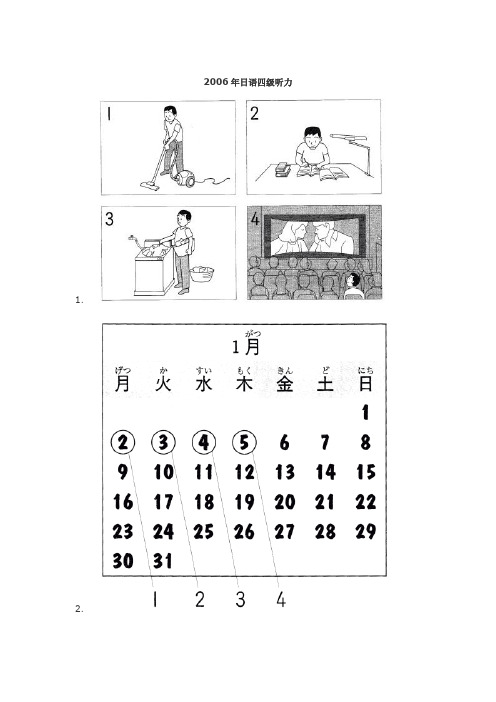
2006年日语四级听力1.2.3.4.5.6.7.8.9.2. 无图题問題I1番女の人と男の人が話しています。
男の人は来週の日曜日の午後何をしますか。
女:ヤンさんは休みの日はいつも何をしていますか。
男:休みの日は朝から掃除と洗濯をします。
そして、午後は買い物をしたり、映画を見たりします。
女:では、来週の日曜日、いっしょに映画を見に行きませんか。
男:ああ、すみません。
来週の月曜日はテストですから、日曜日の午後はうちで勉強します。
女:そうですか。
◆男の人は来週の日曜日の午後何をしますか。
【正解:2】2番女の人と男の人が話しています。
女の人の会社は何日から仕事が始まりますか。
女:田中さんの会社は1月何日から仕事ですか。
男:4日まで休みで、5日から仕事です。
女:いいですね。
わたしの会社は火曜日からもう仕事です。
休みは2日までです。
男:そうですか。
◆女の人の会社は何日から仕事が始まりますか。
【正解:2】3番男の人が話しています。
写真と名前はどうしますか。
男:写真は紙の左に張ってください。
それから、名前は写真の下に書いてください。
◆写真と名前はどうしますか。
【正解:1】4番男の人と女の人が話しています。
男の人に電話するときは何番を押しますか。
男:田中さんの部屋の番号は何番ですか。
女:811です。
男:ああ、わたしの部屋番号は818です。
困ったときは電話してください。
電話するときは始めに9を押して、それから部屋番号を押してください。
女:わかりました。
どうもありがとうございます。
◆男の人に電話するときは何番を押しますか。
【正解:4】5番女の人が話しています。
女の人はどれを見て話していますか。
女:ええ、日本人の大人にお風呂にどのぐらい入るか聞きました。
これを見てください。
一番多かったのは毎日お風呂に入ると答えた人でした。
その次に多かったのが二日に一回入ると答えた人で、毎日お風呂に入る人の半分ぐらいでした。
◆女の人はどれを見て話していますか。
日语专业四级-2006年日语专业四级真题
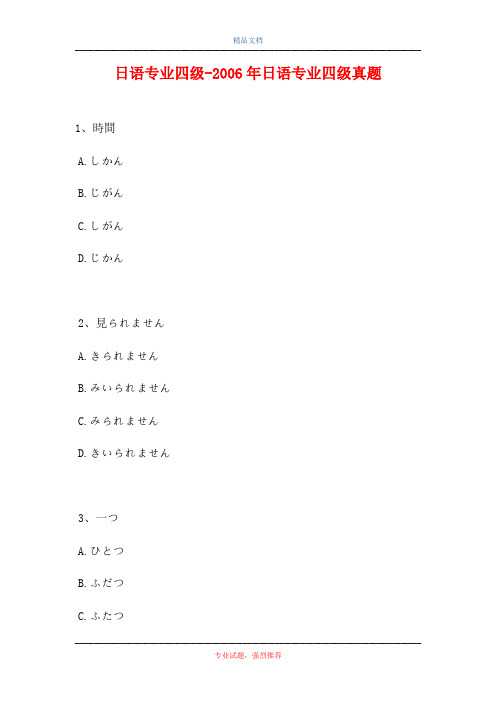
日语专业四级-2006年日语专业四级真题1、時間A.しかんB.じがんC.しがんD.じかん2、見られませんA.きられませんB.みいられませんC.みられませんD.きいられません3、一つA.ひとつB.ふだつC.ふたつD.ひどつ4、千円A.せいえんB.せいねんC.せんねんD.せんえん5、父A.すちB.ちぢC.しちD.つち6、目A.てB.あしC.めD.はな7、耳A.くちB.あたまC.みみD.からだ8、水A.くつB.みずC.きってD.くすり9、買ってA.かってB.つくってC.とってD.あらって10、前A.まいB.めえC.めいD.まえ11、立ってA.たってB.すわってC.のってD.とまって12、半分A.はんぷんB.はんぶんC.ほんぶんD.ほんぷん13、聞いてA.きいてB.おいてC.ひらいてD.はたらいて14、古いA.ぬるいB.わるいC.ふるいD.まるい15、電話A.でんきB.でんわC.てんわD.てんき16、がっこうA.学校B.字校C.字枚D.学枚17、やすんだA.体すんだB.体んだC.休すんだD.休んだ18、なんA.同B.何C.向D.伺19、ぱーてぃーA.ベーティーB.バーティーC.パーディーD.パーティー20、あめA.冊B.両C.雨D.再21、いきませんA.行きませんB.仕きませんC.代きませんD.征きません22、かいしゃA.今杜B.会社C.今社D.会杜23、なかA.史B.中C.央D.内24、らいねんA.未年B.未年C.来年D.来年25、ながいA.辰いB.弄いC.兵いD.長い26、わたしはよるシャワーを___。
A.あびますB.とりますC.なきますD.ぬぎます27、ここでたばこを___ぐださい。
A.かけないでB.きえないでC.すわないでD.つかないで28、はじめまして。
どうぞ___。
A.ごめんぐださいB.ごちそうさまC.こんばんはD.よろしく29、たまごは___いりますか。
A.なんこB.なんさつC.なんだいD.なんまい30、あたらしいことばを___。
2006年普通高等学校招生全国统一考试日语
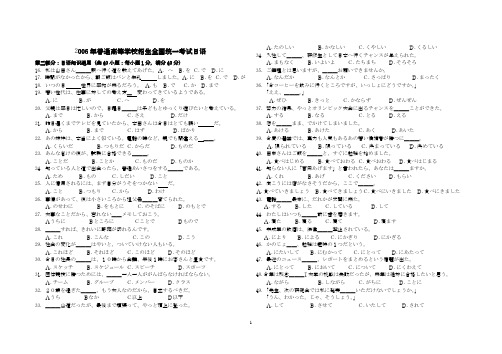
2006年普通高等学校招生全国统一考试日语第二部分:日语知识运用(共40小题:每小题1分,满分40分)16.私は山田さん___駅へ行く道を教えてあげた。
A. へB.をC.でD.に17.時間がなかったから、朝ご飯はパンと牛乳しました。
A.にB.をC.でD.が18.いつの日世界に平和が来るだろう。
A.もB.でC.かD.まで19.若い世代は、仕事に対しての考え方_変わってきているようである。
A.にB.がC.へD.を20.父親は平日は忙しいので、日曜日___は子どもとゆっくり遊びたいと考えている。
A.までB.からC.さえD.だけ21.昨日遅くまでテレビを見ていたから、本田さんは今日はとても眠いだ。
A.からB.までC.はずD.ばかり22.あの姉妹は、本当によく似ている。
電話の時など、親でも間違える__。
A.くらいだB.つもりだC.からだD.ものだ23.あんな怠けの彼が、試験に合格できる___。
A.ことだB.ことかC.ものだD.ものか24.知っている人と道で出会ったら、普通あいさつをする___である。
A.ためB.ものC.しだいD.こと25.人に信用されるには、まず自分がうそをつかないだ。
A.ことB.つもりC.からD.わけ26.事情があって、彼は小さいころから祖父母___育てられた。
A.のせわにB.をもとにC.のそばにD.のもとで27.大事なことだから、忘れない__メモしておこう。
AうちにBところにCことでDもので28.___すれば、きれいに野菜が切れるんです。
A.これB.こんなC.このD.こう29.社会の変化が___はやいと、ついていけない人もいる。
A.これほどB.それほどC.このほどD.そのほど30.今日の社長の___は、10時から会議、午後1時にお客さんと昼食です。
A.スケッチB.スケジュールC.スピーチD.スポーツ31.団体競技に勝つためには、___一人一人ががんばらなければならない。
A.チームB.グループC.メンバーD.クラス32.20歳を過ぎた___、もう大人なのだから、自立するべきだ。
2006年日语成人高等学校招生全国统一考试

2006年成人高等学校招生全国统一考试日语考生注意:答案必须写在答题纸上,写在试题纸上无分,本试卷满分150分,考试时间120分钟。
一、文字与词汇(20分)(一)写假名——用平假名写出下列日语汉字的读音。
(1×10=10分)例:助かる(たす)1.四回2.待つ3.楽だ4.注射5.頼む6.大丈夫7.手足8.放す9.浅い10.弱い(二)写日语汉字——写出下列划线部分的日语汉字。
(1×10=10分)例:けいかくを立てる11.しょうくじが済む。
12.伝統をまもる。
13.新しいワイシャツをきている。
14.あの山はのぼりにくい。
15.草をふまないでください。
16.へたな字を書く。
17.ひるやすみをとらない。
18.入院中の友人をみまう。
19.理解をふかめる。
20.ひじょうの時の用意をする。
二、语法——根据下列各句的意思,从四个选项中选出一个适当的选项,将其序号(A、B、C、D)写在答题纸上。
(1.5×30=45分)例:これ鉛筆です。
(B)A.にB.はC.をD.や21.きれいなくつですね。
これします。
いくらですか。
A.をB.はC.がD.に22.木村さんはもう3日学校に来ていません。
A.もB.をC.がD.で23.これわたしのスピーチを終わります。
A.をB.でC.にD.が24.弟は来年アメリカの大学卒業します。
A.をB.にC.からD.で25.彼がいつ国に帰った分かりません。
A.をB.がC.かD.は26.家まで戻らないで、わたしの傘を使えばよかった。
A.でもB.のにC.までD.だけ27.さっき食べたなのに、もうお中がすいてしまった。
A.ほどB.あとC.ばかりD.ぐらい28.「さあ、どうぞ熱い召し上がってください。
」「はい、いただきます。
」A.うちにB.あいだC.あとでD.うえに29.めがねがない。
たしかここにおいたなんだが。
A.わけB.ものC.はずD.ところ30.健康の毎日ジョギングをしています。
大学日语四级考试样题
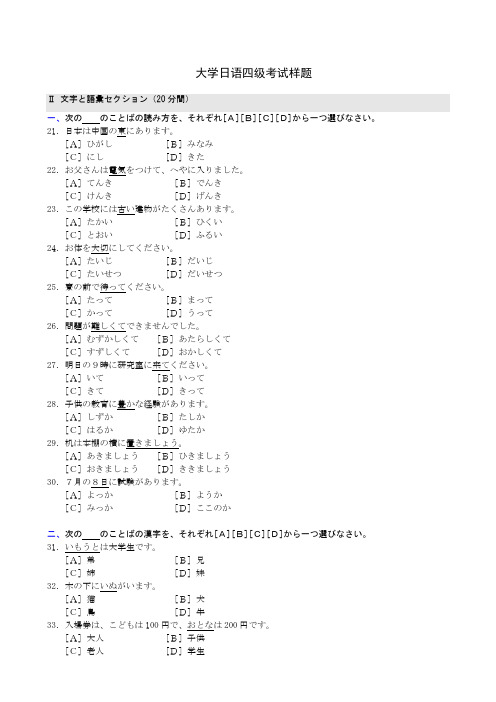
大学日语四级考试样题Ⅱ文字と語彙セクション(20分間)一、次ののことばの読み方を、それぞれ[A][B][C][D]から一つ選びなさい。
21.日本は中国の東にあります。
[A] ひがし[B] みなみ[C] にし[D] きた22.お父さんは電気をつけて、へやに入りました。
[A] てんき[B] でんき[C] けんき[D] げんき23.この学校には古い建物がたくさんあります。
[A] たかい[B] ひくい[C] とおい[D] ふるい24.お体を大切にしてください。
[A] たいじ[B] だいじ[C] たいせつ[D] だいせつ25.寮の前で待ってください。
[A] たって[B] まって[C] かって[D] うって26.問題が難しくてできませんでした。
[A] むずかしくて[B] あたらしくて[C] すずしくて[D] おかしくて27.明日の9時に研究室に来てください。
[A] いて[B] いって[C] きて[D] きって28.子供の教育に豊かな経験があります。
[A] しずか[B] たしか[C] はるか[D] ゆたか29.机は本棚の横に置きましょう。
[A] あきましょう[B] ひきましょう[C] おきましょう[D] ききましょう30.7月の8日に試験があります。
[A] よっか[B] ようか[C] みっか[D] ここのか二、次ののことばの漢字を、それぞれ[A][B][C][D]から一つ選びなさい。
31.いもうとは大学生です。
[A] 弟[B] 兄[C] 姉[D] 妹32.木の下にいぬがいます。
[A] 猫[B] 犬[C] 鳥[D] 牛33.入場券は、こどもは100円で、おとなは200円です。
[A] 大人[B] 子供34.しろいシャツを着ている人が友達の趙さんだ。
[A] 赤い[B] 青い[C] 白い[D] 黒い35.わたしはさかなが嫌いです。
[A] 肉[B] 卵[C] 野菜[D] 魚36.空港へはバスにのれば30分です。
[A] 乗れば[B] 座れば[C] 上れば[D] 登れば37.くらくなりましたね。
2006年日语四级考试试题及答案

2006年日语四级考试试题及答案問題Ⅰ___のことばはどうよみますか。
1234からいちばんいいものをえらびなさい。
問1・えいががすきですが、時間がなくて見られません。
(1).時間1.しかん2.じがん3.しがん4.じかん(2).見られません1.きられません2.みいられません3.みられません4.きいられません問2・これは一つ千円です。
(3).一つ1.ひとつ2.ふだつ3.ふたつ4.ひどつ(4).千円1.せいえん2.せいねん3.せんねん4.せんえん問3・父は目も耳もおおきい。
(5).父1.すち2.ちぢ3.しち4.つち(6).目1.て2.あし3.め4.はな(7).耳1.くち2.あたま3.みみ4.からだ問4・水を買っていきます。
(8).水1.くつ2.みず3.きって4.くすり(9).買って1.かって2.つくって3.とって4.あらって問5・ドアの前に立ってください。
(10).前1.まい2.めえ3.めい4.まえ(11).立って1.たって2.すわって3.のって4.とまって問6・まだCDを半分しか聞いていません。
(12).半分1.はんぷん2.はんぶん3.ほんぶん4.ほんぷん(13).聞いて1.きいて2.おいて3.ひらいて4.はたらいて問7・あの古いいえには電話がありません。
(14).古い1.ぬるい2.わるい3.ふるい4.まるい(15).電話1.でんき2.でんわ3.てんわ4.てんき問題Ⅱ__のことばはどうかきますか。
1234からいちばんいいものをひとつえらびなさい。
問1・さとうさんはきょうがっこうをやすんだ。
(16).がっこう1.学校2.字校3.字枚4.学枚(17).やすんだ1.体すんだ2.体んだ3.休すんだ4.休んだ問2・これはなんのばーていーですか。
(18).なん1.同2.何3.向4.伺(19).ぱーてぃー1.ベーティー2.バーティー3.パーディー4.パーティー問3・あめがふっていますからいきません。
(20).あめ1.冊2.両3.雨4.再(21).いきません1.行きません2.仕きません3.代きません4.征きません問4・わたしのかいしゃはあのビルのなかです。
日语四级 2006真题
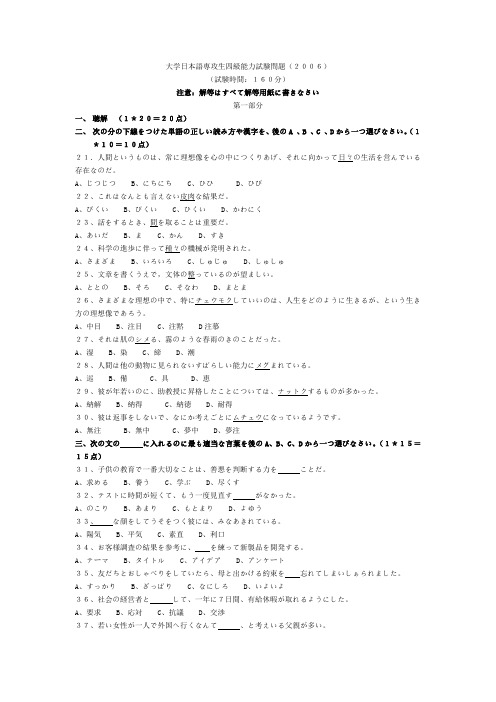
大学日本語専攻生四級能力試験問題(2006)(試験時間:160分)注意:解等はすべて解等用紙に書きなさい第一部分一、聴解(1*20=20点)二、次の分の下線をつけた単語の正しい読み方や漢字を、後のA 、B 、C 、Dから一つ選びなさい。
(1*10=10点)21.人間というものは、常に理想像を心の中につくりあげ、それに向かって日々の生活を営んでいる存在なのだ。
A、じつじつB、にちにちC、ひひD、ひび22、これはなんとも言えない皮肉な結果だ。
A、びくいB、ぴくいC、ひくいD、かわにく23、話をするとき、間を取ることは重要だ。
A、あいだB、まC、かんD、すき24、科学の進歩に伴って種々の機械が発明された。
A、さまざまB、いろいろC、しゅじゅD、しゅしゅ25、文章を書くうえで,文体の整っているのが望ましい。
A、ととのB、そろC、そなわD、まとま26、さまざまな理想の中で、特にチュウモクしていいのは、人生をどのように生きるが、という生き方の理想像であろう。
A、中目B、注目C、注黙 D注慕27、それは肌のシメる、霧のような春雨のきのことだった。
A、湿B、染C、締D、潮28、人間は他の動物に見られないすばらしい能力にメグまれている。
A、巡B、備C、具D、恵29、彼が年若いのに、助教授に昇格したことについては、ナットクするものが多かった。
A、納解B、納得C、納徳D、耐得30、彼は返事をしないで、なにか考えごとにムチュウになっているようです。
A、無注B、無中C、夢中D、夢注三、次の文のに入れるのに最も適当な言葉を後のA、B、C、Dから一つ選びなさい。
(1*15=15点)31、子供の教育で一番大切なことは、善悪を判断する力をことだ。
A、求めるB、養うC、学ぶD、尽くす32、テストに時間が短くて、もう一度見直すがなかった。
A、のこりB、あまりC、もとまりD、よゆう33、な顔をしてうそをつく彼には、みなあきれている。
A、陽気B、平気C、素直D、利口34、お客様調査の結果を参考に、を練って新製品を開発する。
日语专业四级考试样题 答案
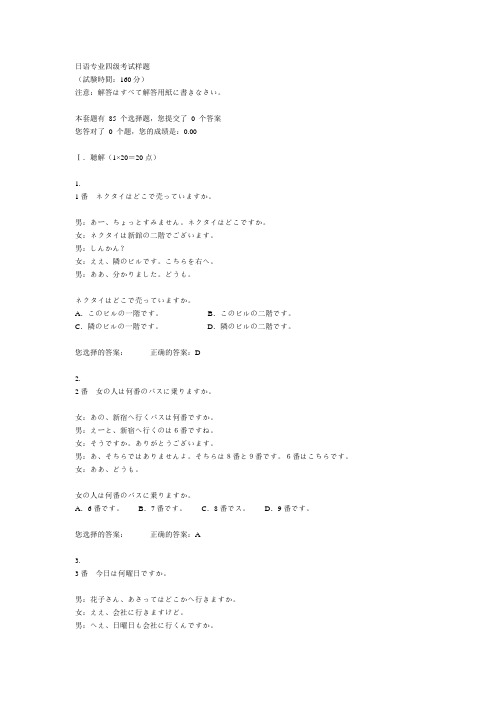
日语专业四级考试样题(試験時間:160分)注意:解答はすべて解答用紙に書きなさい。
本套题有85 个选择题,您提交了0 个答案您答对了0 个题,您的成绩是:0.00Ⅰ.聴解(1×20=20点)1.1番ネクタイはどこで売っていますか。
男:あー、ちょっとすみません。
ネクタイはどこですか。
女:ネクタイは新館の二階でございます。
男:しんかん?女:ええ、隣のビルです。
こちらを右へ。
男:ああ、分かりました。
どうも。
ネクタイはどこで売っていますか。
A.このビルの一階です。
B.このビルの二階です。
C.隣のビルの一階です。
D.隣のビルの二階です。
您选择的答案:正确的答案:D2.2番女の人は何番のバスに乗りますか。
女:あの、新宿へ行くバスは何番ですか。
男:えーと、新宿へ行くのは6番ですね。
女:そうですか。
ありがとうございます。
男:あ、そちらではありませんよ。
そちらは8番と9番です。
6番はこちらです。
女:ああ、どうも。
女の人は何番のバスに乗りますか。
A.6番です。
B.7番です。
C.8番でス。
D.9番です。
您选择的答案:正确的答案:A3.3番今日は何曜日ですか。
男:花子さん、あさってはどこかへ行きますか。
女:ええ、会社に行きますけど。
男:へえ、日曜日も会社に行くんですか。
女:いいえ、あさっては土曜日ですよ。
男:あれ、今日は金曜日でしょう。
女:いいえ、違いますよ。
男:あ、そうか。
今日は何曜日ですか。
A.木曜日です。
B.金曜日です。
C.土曜日です。
D.日曜日です。
您选择的答案:正确的答案:A4.4番男の人は昨日何をしましたか。
女:小林さん、昨日何をしましたか。
男:本を読んでいました。
女:じゃあ、うちにいたんですか。
男:いいえ。
女:あ、じゃあ、図書館?男:いいえ、天気がよかったから公園で。
女:ああ、いいですね。
男の人は昨日何をしましたか。
A.うちにいました。
B.公園で遊びました。
C.図書館に行きました。
D.外で本を読みました。
大学日语4级考试题目
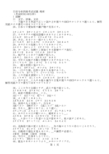
A 抱きがちです B 抱くわけです
C 抱きかねます D 抱くべきです
77.「プラトン」という名前についての説明としてどれが正しいか。
A プラトンのボデイ-スタイルからきたのだ
B プラトンの奴隷という身分からきたのだ
70、雨が_から、傘を持っていった方がいい。
A降るそうだった B降りそうだった C降るそうだD 降りそうだ
71、道が_、電話してください。迎えにいきますから。
A分からなくて B分からないで C分からないと D和からなけば
72、このようなお言葉をいただき、感謝の念に_
52、彼女は肉や魚の入った料理は_食べない。
Aいっさい Bどうしても C何より Dいやいや
53、授業中だったが、先生の顔がおかしくて、笑わずには_
AいられなかったB ありえなかったC おわらなかったD たまらなかった
54、その湖の美しさ_言葉では表現できないほどである。
日语专业四级考试试题 绝密
(考试时间140分钟)
I 読解
II 文字、語彙、文法
一 下線のある単語の正しい読み方を後ろのABCDのからひとつ選らんで、解答用紙のその番号に印をつけてなさい
26、日本では愛知県の瀬戸物が有名です。
Aせこぶつ Bせいとぶつ Cせこもの Dせともの
Aしかも Bもっと Cその代わりD それから
50、あの客は店の品物にいろいろケチをつけた、その_何も買わずに行ってしまった。
Aため Bあげく Cはず Dとおる
51、暫く会わない間に、日本語が上手になった。
A一段と BどうしてもC すべてD いやいや
30、お一人で、気軽にご参加できる新寮のバス旅行。
2006年日语能力测试语法真题解析

2006年语法真題解析(25)週末にはドライブ______、新しい博物館まで行ってみようと思う。
1なりに 2がてら 3がちに 4ながら答案及解析:2。
「がてら」接在动词的连用形、体言的后面,意为“顺便”、“在……同时”、 “借……之便”。
选项1「なりに」接在体言或简体句后,表示与某人或事物相适应的,意为“与……相应的”、“与……相符的”;选项3「がち」是接尾词,可接在一些名词或动词连用形后构成复合形容动词,表示某个不好的清况经常发生,或存在某种不好的倾向,意为“往往……”、“动不动就……”、“经常……”等;选项4「ながら」表示动作同时进行、转折、保持原来的状态等,意为“一边……一边……”、“虽然……,但是……”, “如故”。
翻译:周末驾车兜风的时候,想顺便到新博物馆去看看。
(26)授業終了のベルを聞くが______、生徒たちは教室を飛び出して行った。
1早くて 2早いか 3早くも 4早ければ答案及解析:2。
「が早いか」接在动词终止形后,表示前一个动作或状态刚刚结束,后一个动作或状态马上出现,意为“立刻”、“刚一……就”。
其他选项不能与「が」一起构成约定俗成的句型。
翻译:刚一听到下课的铃声,学生们就跑出了教室。
(27)出席状況・学業成績______、奨学金の支給を停止することもある。
1のいかんでは 2のきわみで 3といえども 4としたって答案及解析:1。
「いかんでは」表示“根据其内容、状态而定”的意思,意为“根据……”、要看”。
选项2中的「きわみ」表示程度达到极致,意为“极其”;选项3表示逆接,意为“即使……”、“虽说……”;选项4中的「したって」意为“即便”。
翻译:根据出席情况、学习成绩,有可能会停止支付奖学金。
(28)親友は、細かい事情を聞くこと______、私にお金を貸してくれた。
1ないで 2なくて 3なしに 4ないか答案及解析:3。
「ことなしに」接在动词的基本形后,用于句子的中顿。
其他选项中的活用形都没有这种用法。
大学日语四级考试真题
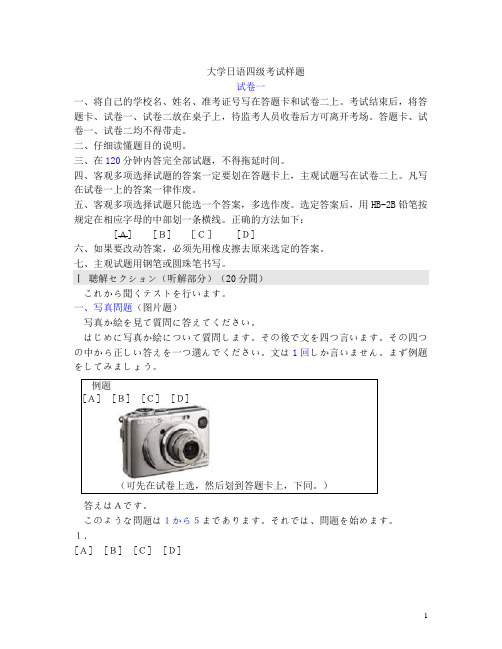
大学日语四级考试样题试卷一一、将自己的学校名、姓名、准考证号写在答题卡和试卷二上。
考试结束后,将答题卡、试卷一、试卷二放在桌子上,待监考人员收卷后方可离开考场。
答题卡、试卷一、试卷二均不得带走。
二、仔细读懂题目的说明。
三、在120分钟内答完全部试题,不得拖延时间。
四、客观多项选择试题的答案一定要划在答题卡上,主观试题写在试卷二上。
凡写在试卷一上的答案一律作废。
五、客观多项选择试题只能选一个答案,多选作废。
选定答案后,用HB-2B铅笔按规定在相应字母的中部划一条横线。
正确的方法如下:[A] [B] [C][D]六、如果要改动答案,必须先用橡皮擦去原来选定的答案。
七、主观试题用钢笔或圆珠笔书写。
Ⅰ聴解セクション(听解部分)(20分間)これから聞くテストを行います。
一、写真問題(图片题)写真か絵を見て質問に答えてください。
はじめに写真か絵について質問します。
その後で文を四つ言います。
その四つの中から正しい答えを一つ選んでください。
文は1回しか言いません。
まず例題をしてみましょう。
例題[A] [B] [C] [D](可先在试卷上选,然后划到答题卡上,下同。
)答えはAです。
このような問題は1から5まであります。
それでは、問題を始めます。
1.[A] [B] [C] [D]2.[A] [B] [C] [D]3.[A] [B] [C] [D]4.[A] [B] [C] [D]5.[A] [B] [C] [D]二、応答問題(应答题)始めに一人が短い文を一つ言う。
その後でもう一人がそれに答える。
正しい答えを[A][B][C][D]から、一つ選んでください。
文は一回しか言いない。
まず例題をしてみよう。
例題[A] [B] [C] [D]答えはAです。
このような問題は6から10まであります。
それでは、問題を始めます。
6.[A] [B] [C] [D]7.[A] [B] [C] [D]8.[A] [B] [C] [D]9.[A] [B] [C] [D]10.[A] [B] [C] [D]三、会話問題(对话题)二人の会話を聞いて、質問に答えてください。
2006年专四真题原文
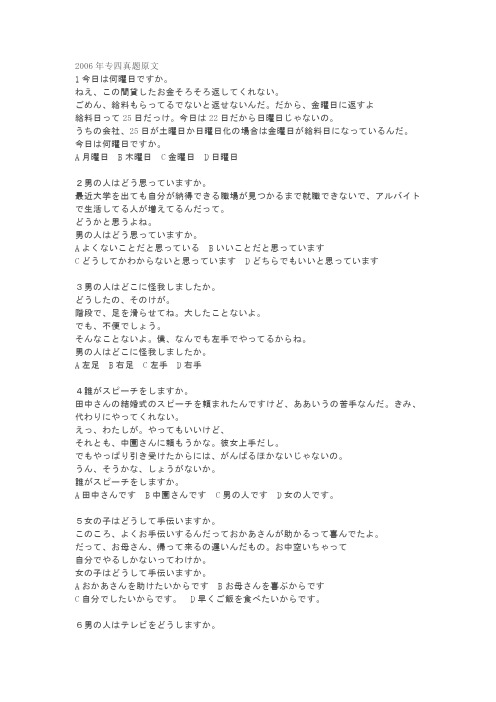
2006年专四真题原文1今日は何曜日ですか。
ねえ、この間貸したお金そろそろ返してくれない。
ごめん、給料もらってるでないと返せないんだ。
だから、金曜日に返すよ給料日って25日だっけ。
今日は22日だから日曜日じゃないの。
うちの会社、25日が土曜日か日曜日化の場合は金曜日が給料日になっているんだ。
今日は何曜日ですか。
A月曜日B木曜日C金曜日D日曜日2男の人はどう思っていますか。
最近大学を出ても自分が納得できる職場が見つかるまで就職できないで、アルバイトで生活してる人が増えてるんだって。
どうかと思うよね。
男の人はどう思っていますか。
Aよくないことだと思っているBいいことだと思っていますCどうしてかわからないと思っていますDどちらでもいいと思っています3男の人はどこに怪我しましたか。
どうしたの、そのけが。
階段で、足を滑らせてね。
大したことないよ。
でも、不便でしょう。
そんなことないよ。
僕、なんでも左手でやってるからね。
男の人はどこに怪我しましたか。
A左足B右足C左手D右手4誰がスピーチをしますか。
田中さんの結婚式のスピーチを頼まれたんですけど、ああいうの苦手なんだ。
きみ、代わりにやってくれない。
えっ、わたしが。
やってもいいけど、それとも、中園さんに頼もうかな。
彼女上手だし。
でもやっぱり引き受けたからには、がんばるほかないじゃないの。
うん、そうかな、しょうがないか。
誰がスピーチをしますか。
A田中さんですB中園さんですC男の人ですD女の人です。
5女の子はどうして手伝いますか。
このころ、よくお手伝いするんだっておかあさんが助かるって喜んでたよ。
だって、お母さん、帰って来るの遅いんだもの。
お中空いちゃって自分でやるしかないってわけか。
女の子はどうして手伝いますか。
Aおかあさんを助けたいからですBお母さんを喜ぶからですC自分でしたいからです。
D早くご飯を食べたいからです。
6男の人はテレビをどうしますか。
うちのテレビ壊れちゃったんだ、新しいの買うかな。
日语四级试题

日语四级试题(正文内容)第一部分:听力理解(共25题,每题1分,共25分)第一节:听对话,回答问题1. A. On Wednesday. B. On Thursday. C. On Friday.2. A. Watch a movie. B. Go to a concert. C. Visit a museum.3. A. She lost her wallet. B. She found her wallet. C. She forgot her wallet.4. A. She needs a break. B. She doesn't like roller coasters. C. She is afraid of heights.5. A. 9:15. B. 9:30. C. 9:45.(以下省略剩余题目及选项)第二节:听对话,回答问题26. A. A teacher and a student. B. A manager and a customer. C. A doctor and a patient.27. A. History. B. Biology. C. Chemistry.28. A. It was boring. B. It was difficult. C. It was interesting.(以下省略剩余题目及选项)第三节:听独白,回答问题46. A. A hotel. B. A library. C. A hospital.47. A. It is close to the beach. B. It has a swimming pool. C. It has a restaurant.48. A. On the first floor. B. On the second floor. C. On the third floor.(以下省略剩余题目及选项)第二部分:阅读理解(共25题,每题1分,共25分)第一篇51. B. In a library.52. D. The history of bicycles.53. C. He was injured in a car accident.54. A. In 2014.55. D. It is energy-efficient.(以下省略剩余题目及选项)第二篇76. B. They were punished for a mistake.77. C. It would be better than his previous job.78. A. Competition and politics.79. D. He helped invent the game of basketball.80. B. Methods of dealing with stress.(以下省略剩余题目及选项)第三部分:写作(共3题,第一题10分,第二题20分,第三题20分,共50分)第一题:请根据以下提示,写一篇100字左右的短文。
2006年职称日语考试真题试卷及题型分析

2006年职称日语考试真题试卷及题型分析2008-1-4 10:58:00 来源:频道:职称日语A级短句1、もう12時だから、まずお昼を食べて()仕事をしましょう。
A. それでB.それにC.それからD.そこで2、理事会は水曜日に開くか、()土曜日に開くか、まだ決まっていません。
A.そしてB.それにC.たとえばD.それとも3、彼は外国に行ったことがありません。
()外国のことをよく知っています。
A.ところでB.それでもC.ですからD.そこで4、鈴木さんはハンサムで()才能もあるので、会社で人気があります。
A.しかしB.ところがC.そのうえD.それでも5、何回も電話をしましたが、彼は()来なかった。
A.ついにB.いずれC.つまりD.少しも6、食糧問題は()深刻になってきました。
A.もうすぐB.まもなくC.いまにもD.ますます7、結果はともかく、自分としてはベストを尽くした()です。
A.ためB.せいC.つもりD.かぎり8、あの赤いリボンを付けている女の子は、大きな目()。
A.をしていますB. がしていますC.になっていますD.がなっています9、一生懸命にがんばること()成功へ導く道です。
A.さえB.こそC.なりD.だけ10、お客さんは五人来ますが、ビールはこれだけあれば()でしょう。
A.ほとんどB.十分C.すべてD.全部11、あと一点取っていれば、私も合格できたのに、()。
A.くやしくならないB. くやしくてかぎりないC. くやしくてたまらないD. くやしくてたりない12、できるだけのことをしてだめだったのだから、諦める()でしょう。
A.ほかないB.ことがないC.はずないD.しかたがない13,井上先生の小説は日本()海外でも高く評価されている。
A.のみならずB.さえならずC.だけならずD.ばかりなく14、私たちの若い頃と違いまして、最近の若い人は自分の時間を大事にするようになって()ね。
A.いましたB.みなしたC.きましたD.いきました15、「社長の昨日のあの態度には、ぼくも本当に腹がたったよ。
- 1、下载文档前请自行甄别文档内容的完整性,平台不提供额外的编辑、内容补充、找答案等附加服务。
- 2、"仅部分预览"的文档,不可在线预览部分如存在完整性等问题,可反馈申请退款(可完整预览的文档不适用该条件!)。
- 3、如文档侵犯您的权益,请联系客服反馈,我们会尽快为您处理(人工客服工作时间:9:00-18:30)。
文字・語彙(100点 25分)問題Ⅰ___のことばはどうよみますか。
1234からいちばんいいものをえらびなさい。
問1・えいががすきですが、時間がなくて見られません。
(1).時間1.しかん2.じがん3.しがん4.じかん(2).見られません1.きられません2.みいられません3.みられません4.きいられません問2・これは一つ千円です。
(3).一つ1.ひとつ2.ふだつ3.ふたつ4.ひどつ(4).千円1.せいえん2.せいねん3.せんねん4.せんえん問3・父は目も耳もおおきい。
(5).父1.すち2.ちぢ3.しち4.つち(6).目1.て2.あし3.め4.はな(7).耳1.くち2.あたま3.みみ4.からだ問4・水を買っていきます。
(8).水1.くつ2.みず3.きって4.くすり(9).買って1.かって2.つくって3.とって4.あらって問5・ドアの前に立ってください。
(10).前1.まい2.めえ3.めい4.まえ(11).立って1.たって2.すわって3.のって4.とまって問6・まだ CDを半分しか聞いていません。
(12).半分1.はんぷん2.はんぶん3.ほんぶん4.ほんぷん(13).聞いて1.きいて2.おいて3.ひらいて4.はたらいて問7・あの古いいえには電話がありません。
(14).古い1.ぬるい2.わるい3.ふるい4.まるい(15).電話1.でんき2.でんわ3.てんわ4.てんき問題Ⅱ___のことばはどうかきますか。
1234からいちばんいいものをひとつえらびなさい。
問1・さとうさんはきょうがっこうをやすんだ。
(16).がっこう1.学校2.字校3.字枚4.学枚(17).やすんだ1.体すんだ2.体んだ3.休すんだ4.休んだ問2・これはなんのばーていーですか。
(18).なん1.同2.何3.向4.伺(19).ぱーてぃー1.ベーティー2.バーティー3.パーディー4.パーティー問3・あめがふっていますからいきません。
(20).あめ1.冊2.両3.雨4.再(21).いきません1.行きません2.仕きません3.代きません4.征きません問4・わたしのかいしゃはあのビルのなかです。
(22).かいしゃ1.今杜2.会社3.今社4.会杜(23).なか1.史2.中3.央4.内問5・らいねんはながいやすみがほしいです。
(24).らいねん1.未年2.未年3.来年4.来年(25).ながい1.辰い2.弄い3.兵い4.長い問題Ⅲ______のところになにをいれますか。
1234からいちばんいいものをひとつえらびなさい。
(26).わたしはよるシャワーを___。
1.あびます2.とります3.なきます4.ぬぎます(27).ここでたばこを___ぐださい。
1.かけないで2.きえないで3.すわないで4.つかないで(28).はじめまして。
どうぞ___。
1.ごめんぐださい2.ごちそうさま3.こんばんは4.よろしく(29).たまごは___いりますか。
1.なんこ2.なんさつ3.なんだい4.なんまい(30).あたらしいことばを___。
1.もちます2.なります3.おぼえます4.つとめます(31).きょうはかぜが___です。
1.みじがい2.つよい3.ふとい4.ほそい(32).うみには___ひとがたぐさんいました。
1.あさい2.うすい3.からい4.わかい(33).にほんごでながい___をかきました。
1.にもつ2.てがみ3.いろ4.え(34).こうさてんの___にびょういんがあります。
1.そば2.たて3.にわ4.はこ(35).この___はおいしいです。
1.かびん2.とけい3.めがね4.やさい問題Ⅳ______のぶんとだいたいおなじいみのぶんはどれですか。
1234からいちばんいいものをひとつえらびなさい。
(36).わたしはじがへたです。
1.わたしはじがまるくありません。
2.わたしはじがおおきくありません。
3.わたしはじがすきではありません。
4.わたしはじがじょうずではありません。
(37).きむらさんのおばさんはあのひとです。
1.きむらさんのおかあさんのおかあさんはあのひとです。
2.きむらさんのおかあさんのおとうさんはあのひとです。
3.きむらさんのおかあさんのいもうとさんはあのひとです。
4.きむらさんのおかあさんのおとうとさんはあのひとです。
(38).げんかんにだれかいますよ。
1.いえのいりぐちにひとがいます。
2.がっこうのろうかにひとがいます。
3.まどのちかくにひとがいます。
4.ビルのうえにひとがいます。
(39).にほんへははじめていきます。
1.にほんへはあまりいきません。
2.にほんへはまだいっていません。
3.にほんへはよくいきます。
4.にほんへ1かいいきました。
(40).やまださんはすずきさんにえいごをおしえました。
1.すずきさんはやまださんにえいごをみせました。
2.やまださんはすずきさんにえいごををみせました。
3.すずきさんはやまださんにかえいごをならいました。
4.やまださんはすずきさんにえいごをならいました。
読解・文法(200点 50分)問題Ⅰ______のところになにをいれますか。
1234からいちばんいいものをひとつえらびなさい。
問(1)毎日しんぶん___読みます。
1.が2.に3.を4.へ問(2)きのうのパーティー___何をしましたか。
1.を2.で3.へ4.が問(3)りんご___3つ買いました。
1.が2.に3.の4.を問(4)どの人___山下さんですか。
1.が2.を3.は4.か問(5)わたしはおじいさん___よくさんぽをします。
1.と2.を3.の4.へ問(6)ナイフ___パンをきりました。
1.で2.が3.に4.を問(7)おすしを食べました。
それから、てんぷら___食べました。
1.が2.か3.は4.も問(8)すみません、お水___ください。
1.が2.を3.に4.や問(9)としょかんで3時間べんきょうしました。
でも、うち___しませんでした。
1.とは2.がは3.には4.では問(10)わたしは友だち___電話をしました。
1.に2.や3.を4.で問(11)あにはサッカー___すきです。
1.と2.の3.が4.に問(12)12時___なりました。
ひるごはんの時間です。
1.が2.に3.から4.へ問(13)車のうしろ___子どもがいます。
1.に2.で3.を4.へ問(14)母はかぜ___びょういんへ行きました。
1.lに2.が3.で4.は問(15)カトレア___いう店をしっていますか。
1.を2.が3.に4.と問題Ⅱ______のところになにをいれますか。
1234からいちばんいいものをひとつえらびなさい。
問(16)わたしのへやはあまり___。
1.きれくないです2.きれくありません3.きれいありません4.きれいじゃありません問(17)きのうははを___ねました。
1.みがくないで2.みがかないで3.みがないで4.みがきないで問(18)ギターを___ください。
1.ひきて2.ひいて3.ひいで4.ひきって問(19)あしたはゆきが___でしょう。
1.ふりて2.ふって3.ふる4.ふると問(20)中山「いますぐでかけましょうか。
」上田「いいえ、そうじを___からでかけましょう。
」1.して2.した3.する4.しって問(21)さいふを___こまりました。
1.なくします2.なくした3.なくす4.なくして問(22)来週国へ___人はいますか。
1.かえっての2.かえる3.かえるの4.かえって問(23)もう少し___してくださいませんか。
1.しずかに2.しずかだ3.しずか4.しずかで問(24)先週はしゅくだいが多くて___。
1.たいへんしました2.たいへんです3.たいへんでした4.たいへんだったでした問(25)しごとが___なりました。
1.いそがしいに2.いそがしく3.いそがしい4.いそがしくて問(26)わたしは外国で___たい。
1.はたらけ2.はたらい3.はたらく4.はたらき問(27)あのケーキは___よ。
1.おいしくなかった2.おいしいくなかった3.おいしいじゃなかった4.おいしくないだった問(28)___ながら食べないでください。
1.あるく2.あるいて3.あるき4.あるかな問(29)___ときは、先生に聞きます。
1.わからないの2.わからない3.わかったの4.わかって問(30)このレストランはいつもたくさん人が___ね。
1.ならんであります2.ならべています3.ならんでいます4.ならべてあります問題Ⅲ______のところになにをいれますか。
1234からいちばんいいものをひとつえらびなさい。
問(31)___でえいがを見ますか。
1.どこ2.どんな3.どう4.どのか問(32)わたしは___買いませんでした。
1.どれを2.いくら3.何か4.何も問(33)きょうはよる9時___かえります。
1.じゅう2.まで3.ごろ4.ぐらい問(34)あしたわたしのへやへあそびに___か。
1.きてください2.きました3.きません4.きましょう問(35)ぎゅうにゅうはぜんぶ飲みました。
___ありません。
1.とても2.もっと3.まだ4.もう問(36)ゆうべは___ねましたか。
1.どんな2.どのぐらい3.いくつ4.どちら問題Ⅳどのこたえがいちばんいいですか。
1234からいちばんいいものをひとつえらびなさい。
問(37)A「かいぎのへやは4かいですね。
」B「___。
5かいですよ。
」1.はい、そっです2.とてもいいです3.いいえ、ちがいます4.わかりません問(38)A「だれがおさらをあらいましたか。
」B「___。
」1.いいえ、あらいませんでした2.父のおさらです3.父があらいました4.はい、あらいました問(39)(電話で)A「もしもし、すずきです。
そちらに中田さんはいますか。
」B「はい、___。
」1.そちらはすずきです2.ちょっとまってください3.そちらにいます4.中田さんですたはい問(40)A「ごはんを食べてから、おふろに入りますか。
」B「いいえ、わたしは___。
」1.ごはんのまえに入ります2.食べたあとで入ります3.いつも一人で食べます4.ごはんをたくさん食べません問題Ⅴつぎのぶんを読んでしつもんにこたえなさい。
こたえは 1・2・3・4からいちばんいいものを一つえらびなさい。
学生「すみません。
この本をかりたいです。
」としょかんの人「この学校の学生ですか。
」学生「はい。
」としょかんの人「では、はじめにこのかみに名前とじゅうしょと電話ばんこうを書いてぐださい。
」学生「はい。
」としょかんの人「書きましたか。
」学生「はい。
」としょかんの人「これはじしょですね。
じしょかんの中でつかってぐださい。
」学生「はい、わかりました。
では、この7さつをかしてぐださい。
」としょかんの人「ああ、学生は4さつまでです。
」学生「そうですか。
